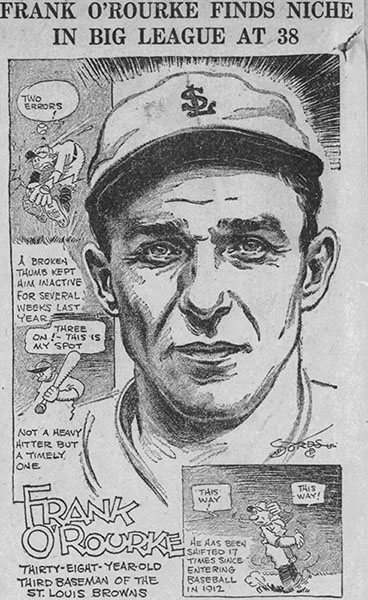Major League Baseball Statistics (1912-1931):
- 1,131 games
- 4,069 at-bats (4,611 plate appearances)
- 1,032 hits (.254 career batting average)
- 196 doubles
- 42 triples
- 15 home runs
- 429 runs-batted-in
Baseball Reference estimates that Frank O'Rourke earned perhaps $65,000 during his major league career.

James Francis O'Rourke ("Frank" or "Blackie") was born on 28 November 1891 in Hamilton, Ontario. The family had briefly moved there from Sandusky, Ohio while looking for work, but by 1900 the family was living in Slatington where the father worked in the rolling mill.
In a 1929 article in the St. Louis Star, O'Rourke wrote that he and his family moved to Elizabeth, NJ in about 1905 when Frank was fourteen. He said that he "did not care much for baseball until we moved to Elizabeth. Football was my game. I got interested in baseball, [and] found I could play it." In 1911 he was playing for the Belmont semi-professional team in Elizabeth when he was discovered. The next year he was off to the Bridgeport Orators in the Connecticut State League. Then, that June he was sold to the Boston Braves. As O'Rourke later recalled, he showed up in Boston and was in the lineup the next day for his first major league game, but he was found to be "too inexperienced," and in the winter he was traded to Buffalo. Then began a long caravan of teams through the minor and major leagues: Wilkes-Barre, Utica, briefly the Brooklyn Robins, New London, Binghamton, Toronto, Washington Senators, Boston Red Sox, Toronto, Detroit Tigers and finally the St. Louis Browns in 1927.
According to O'Rourke, he acquired his nickname of "Blackie" when he was with the Utica Utes (New York State League) in 1917. On 1 July, O'Rourke led a protest by four players that unless salaries were paid, they would not play. The owners said that there was no money for the men. When the players returned to the ballpark that afternoon, they discovered that the game was in progress, and they sat down in the bleachers. A sportswriter led his account of the game with the heading, "Four Blackbirds, Sitting on a Fence," and the "Blackie" nickname stuck for Frank. PS. that club disbanded a few days later on 4 July.
After his lengthy major league playing career was over, O'Rourke was a player-manager for the Milwaukee Brewers (St. Louis minor league system) in 1931, 1932 and 1933.
In 1934 he was a coach and utility infielder for the Montreal Royals (unknown minor league affiliation). In 1935, he managed the Charlotte Hornets (Boston Red Sox minor league system), and from 1936-1939 he was player manager for the El Dorado Lions (Arkansas) in the Cotton States League.
In 1941, the Cincinnati Reds hired O’Rourke as a scout, and he scouted for the Reds from 1943 to 1951, and then he continued his scouting work for the New York Yankees from 1952 to 1985.
O'Rourke's kept up his ties to Slatington during his early baseball career. Despite what he said in the 1929 interview, it is not clear when exactly he left Slatington permanently. He often visited the town through the 1910s and 1920s, and several times he returned to play semi-professional baseball with the town's team. He also brought a barn-storming major league team through the town in the late 1920s. Both The Slatington News and The Morning Call newspapers published news of O'Rourke's career.
He married twice. On 28 March 1913, in Slatington he married Jennie Roberts of town. They had two daughters, one of whom died in 1914. They divorced in 1915. He married again (one daughter) and lived in Elizabeth, NJ for the rest of his life.
He retired from baseball in 1985 at age 91.
This illustration was done by Jack Sords (1899-1960) and appeared in The Morning Call on 1 June 1929. Sords was a sports cartoonist and columnist for the Central Press, a syndication arm of King Features Syndicate, based in Cleveland, OH.
Minor League Baseball Statistics (1912-1939):
- 1,461 games
- 5,216 at-bats (5,282 plate appearances)
- 1,550 hits (.297 career batting average)
- 177 doubles
- 38 triples
- 21 home runs

